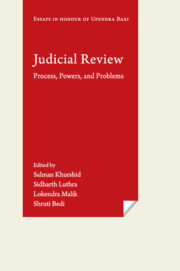Book contents
- Frontmatter
- Contents
- Foreword
- Editors' Note
- Introduction
- 1 The Inadequacy of Judicial Enforcement of Constitutional Rights Provisions to Rectify Economic Inequality, and the Inevitability of the Attempt
- 2 The Interplay of Law and Politics in India
- 3 Beating the Backlog: Reforms in Administration of Justice in India
- 4 Judicial Review: Perspectives and Reflections for the Twenty-First Century
- 5 When ‘Creeping Jurisdiction’ Goes Awry: The Social Action Litigation to Ban Surrogacy
- 6 Judicial Review and the Democratic Judge
- 7 Judicial Review: A Tool to Shape Constitutional Jurisprudence
- 8 The Baxian Bioscope on Indian Judicial Process
- 9 Judicial Activism, Courts, and Constitutional Revolutions: The Israeli Case
- 10 Democracy, Constitution, and Judicial Review: A Critique
- 11 A Minor Jurisprudence of Pathos: Upendra Baxi as Teacher and Writer
- 12 The Need for Reinventing the Supreme Court as a Constitutional Court
- 13 Appointment of ‘Distinguished Jurists’ as Judges in the Supreme Court of India: A Critical Analysis
- 14 Judicial Dissent and Judicial Review: A Functional Analysis
- 15 The Power of Judicial Review: Judicial Chutzpah or Judicial Desideratum
- 16 Judicial Review of Legislations by Tribunals in India: Law, Problems, and Perspectives
- 17 Criminalization of Membership of Terrorist Organizations in India and the United States of America: Human Rights Concerns
- 18 Article 142 of the Indian Constitution: On the Thin Line between Judicial Activism and Restraint
- 19 Sketching the Limits of Article 142 of the Constitution of India: A Constitutional Necessity
- 20 Constitutional Morality and Judges of the Supreme Court
- About the Contributors
- Index
4 - Judicial Review: Perspectives and Reflections for the Twenty-First Century
Published online by Cambridge University Press: 23 January 2020
- Frontmatter
- Contents
- Foreword
- Editors' Note
- Introduction
- 1 The Inadequacy of Judicial Enforcement of Constitutional Rights Provisions to Rectify Economic Inequality, and the Inevitability of the Attempt
- 2 The Interplay of Law and Politics in India
- 3 Beating the Backlog: Reforms in Administration of Justice in India
- 4 Judicial Review: Perspectives and Reflections for the Twenty-First Century
- 5 When ‘Creeping Jurisdiction’ Goes Awry: The Social Action Litigation to Ban Surrogacy
- 6 Judicial Review and the Democratic Judge
- 7 Judicial Review: A Tool to Shape Constitutional Jurisprudence
- 8 The Baxian Bioscope on Indian Judicial Process
- 9 Judicial Activism, Courts, and Constitutional Revolutions: The Israeli Case
- 10 Democracy, Constitution, and Judicial Review: A Critique
- 11 A Minor Jurisprudence of Pathos: Upendra Baxi as Teacher and Writer
- 12 The Need for Reinventing the Supreme Court as a Constitutional Court
- 13 Appointment of ‘Distinguished Jurists’ as Judges in the Supreme Court of India: A Critical Analysis
- 14 Judicial Dissent and Judicial Review: A Functional Analysis
- 15 The Power of Judicial Review: Judicial Chutzpah or Judicial Desideratum
- 16 Judicial Review of Legislations by Tribunals in India: Law, Problems, and Perspectives
- 17 Criminalization of Membership of Terrorist Organizations in India and the United States of America: Human Rights Concerns
- 18 Article 142 of the Indian Constitution: On the Thin Line between Judicial Activism and Restraint
- 19 Sketching the Limits of Article 142 of the Constitution of India: A Constitutional Necessity
- 20 Constitutional Morality and Judges of the Supreme Court
- About the Contributors
- Index
Summary
The task of human rights, in terms of making the state ethical, governance just and power accountable, are tasks that ought to continue to define the agendum of activism.
—U. BaxiIntroduction
Upendra Baxi's commitment to the values of justice, fairness, and humanitarian principles is easy to discern from his many publications and from a highly distinguished academic career. This commitment is in evidence from his earliest years growing up and attending university in Bombay and later as an academic. Baxi followed an activist's path, advocating law reform, improved legal education, and a pioneering role in his advocacy of promoting social action litigation. Frustrations and disappointments about law and the legal system were in abundance. A staunch critic of the early jurisprudence of the Indian Supreme Court, Baxi strongly believed that the socially disadvantaged should gain direct access to the courts to have their voice heard and to make their case. Litigation arising from violence against women and opposition to large dam projects are examples of his pioneering efforts. The Bhopal disaster in 1984 with its human toll touched his sense of outrage of justice denied to the poorest and the most dispossessed. The Bhopal litigation was perhaps one of the most transformative events that helped shape his future thinking about law and legal litigation. This chapter addresses the potential for social action litigation through judicial review that may help address poverty and suffering and raise questions about social justice and environmental issues including climate change.
Baxi's General Jurisprudence?
It is hard to estimate the extent of any single scholar's influence on another but there are some special scholars that deserve mention as their influence helped to underpin many of Baxi's views. Perhaps, with the benefit of hindsight, the most influential was Julius Stone, the legal theorist and public international lawyer at the University of Sydney where Baxi taught law. Through Stone, he was influenced by Roscoe Pound, a renowned writer on sociologist jurisprudence. Together with Stone and Pound, the thinking of Gramsci as well as Marx and Gandhi came to inform much of Baxi's writing. History may well record the late twentieth century as a period of sociological jurisprudence. In Baxi's mind, it was a deeply personal commitment to the judicial process and social action to remedy injustice. Baxi's own writing reflected time and place.
- Type
- Chapter
- Information
- Judicial Review , pp. 60 - 78Publisher: Cambridge University PressPrint publication year: 2020



